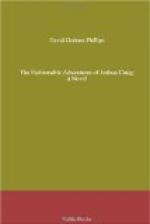Thus the opening of the honeymoon was most auspicious. Craig, too much in awe of Margaret to bother her, and busy about matters that concerned himself alone, was a model of caution, restraint and civility. Margaret, apparently calm, aloof and ladylike, was really watching his discreet conduct as a hawk watches a sheltered hen; she began to indulge in pleasant hopes that Joshua’s wild days had come to an abrupt end. Why, he was even restrained in conversation; he did not interrupt her often, instantly apologized and forebore when he did; he poured out none of his wonted sophomoric diatribes, sometimes sensible, more often inane, as the prattle of a great man in his hour of relaxation is apt to be. She had to do most of the talking—and you may be sure that she directed her conversation to conveying under an appearance of lightness many valuable lessons in the true wisdom of life as it is revealed only to the fashionable idle. She was careful not to overdo, not to provoke, above all not to put him at his ease.
Her fiction of ill health, of threatened nervous prostration, also served to free her from an overdose of his society during the long and difficult days in that eventless solitude. He was all for arduous tramps through the woods, for excursions in canoe under the fierce sun. She insisted on his enjoying himself—“but I don’t feel equal to any such exertion. I simply must rest and take care of myself.” She was somewhat surprised at his simplicity in believing her health was anything but robust, when her appearance gave the lie direct to her hints and regrets. While he was off with one of the guides she stayed at camp, reading, working at herself with the aid of Selina, revolving and maturing her plans.
When she saw him she saw him at his best. He showed up especially well at swimming. She was a notable figure herself in bathing suit, and could swim in a nice, ladylike way; but he was a water creature—indeed, seemed more at home in the water than on land. She liked to watch his long, strong, narrow body cut the surface of the transparent lake with no loss of energy in splashing or display—as easy and swift as a fish. She began to fear she had made a mistake in selecting a place for her school for a husband, “He’s in his element—this wilderness,” thought she, “not mine. I’ll take him back with everything still to be done.”
And, worst of all, she found herself losing her sense of proportion, her respect for her fashionable idols. Those vast woods, that infinite summer sky—they were giving her a new and far from practical point of view—especially upon the petty trickeries and posturings of the ludicrously self-important human specks that crawl about upon the earth and hastily begin to act queer and absurd as soon as they come in sight of each other. She found herself rapidly developing that latent “sentimentality” which her grandmother had so often rebuked and warned her against —which Lucia had insisted was




